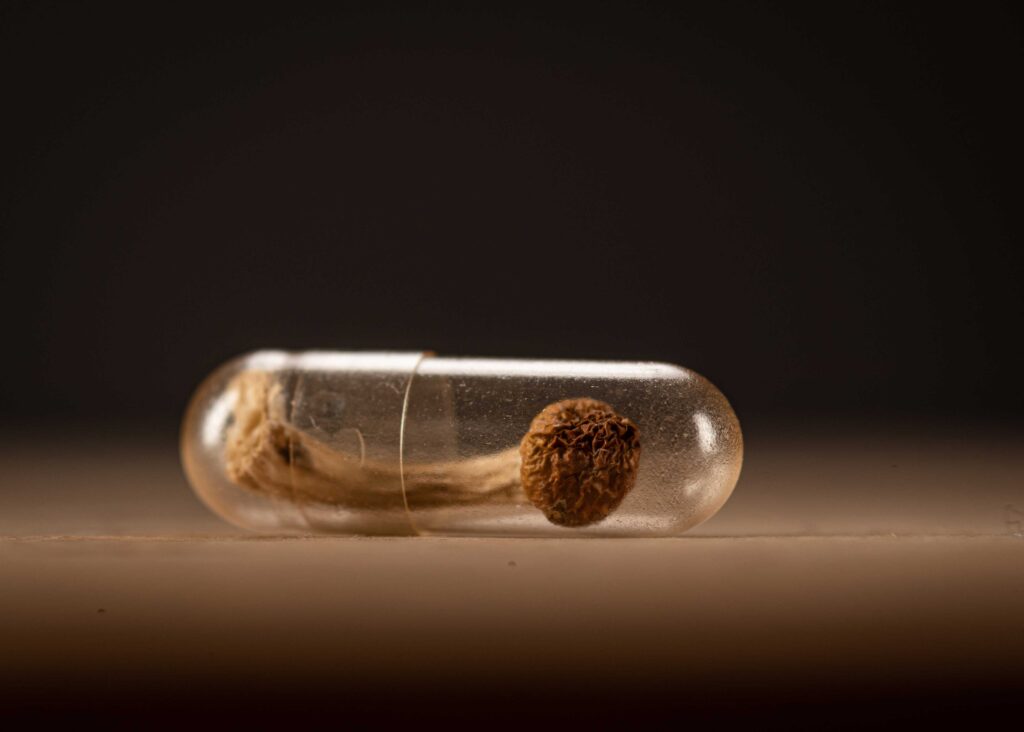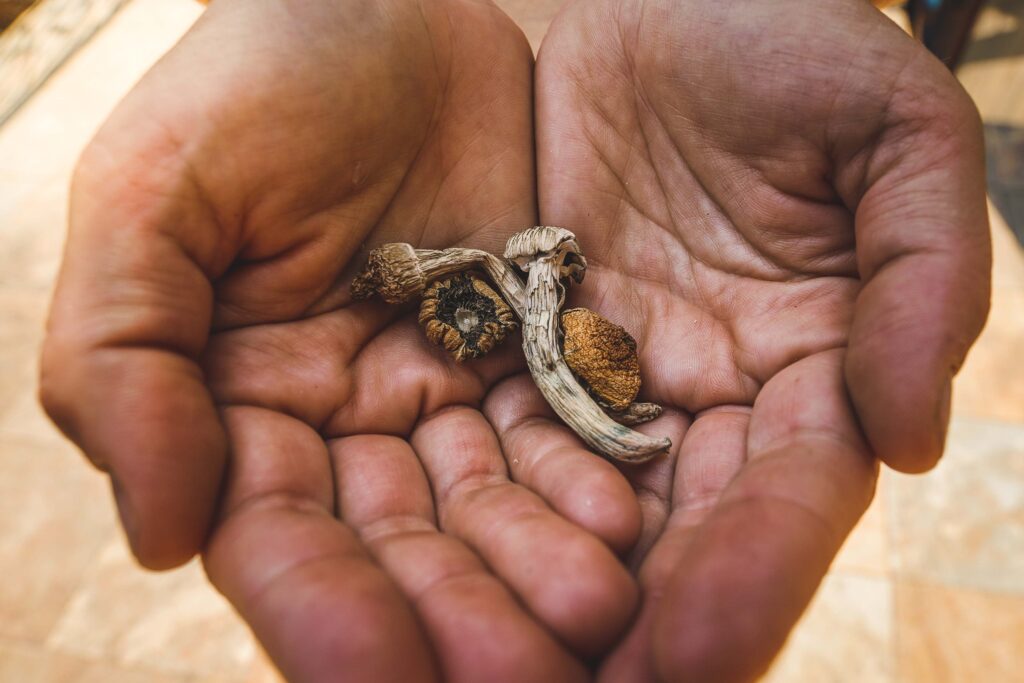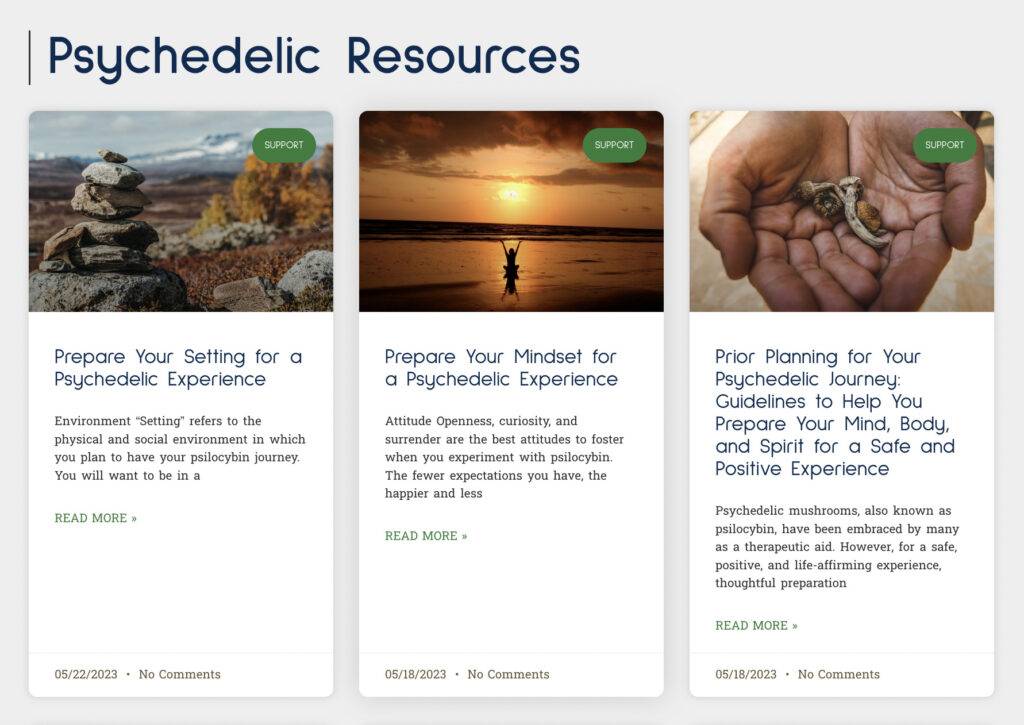Many people turn to psilocybin as a natural way to decrease their dependence on certain pharmaceutical medications — most commonly antidepressants, opiates, and antipsychotics. This section briefly discusses potential interactions between psilocybin and antidepressants along with a few other substances.
Please recognize that each person is unique. Just because two individuals take the same medication, it does not necessarily mean that they will benefit from the same course of treatment. Your medical history, intentions for taking medication, and how long you have been taking medication are factors to consider. If you are currently taking any pharmaceutical medication, we suggest exercising caution, doing extensive research, and consulting with competent professionals, before experimenting with psilocybin.
Here are some conservative guidelines you may consider:
- Common antidepressants (e.g., Zoloft, Prozac, Lexapro, Effexor, Remeron): In general, preliminary research has shown that it is safe to take psilocybin with these medications, but you may find that they dull or nullify the effects of psilocybin. You may need to take more psilocybin in order to make up for the blunting effect of the antidepressant. You may consider tapering off from and discontinuing these types of medications prior to using psychedelics. However, many journeyers start taking psilocybin while they are still on antidepressants.
- Bupropion (Wellbutrin): It is safe to take psilocybin while on Bupropion as they do not appear to interact in any meaningful way. Still, you may consider tapering off from and discontinuing this medication depending on your intentions for using psilocybin.
- Antipsychotics (e.g., aripiprazole, asenapine, cariprazine, clozapine, haloperidol, lurasidone, olanzapine, quetiapine, risperidone, ziprasidone): are typically prescribed for people who have been diagnosed with BD or schizophrenia.They are also given to people suffering from depression, anxiety, insomnia, and OCD. If you have a psychotic disorder, it is not recommended that you work with psilocybin, as it can trigger psychotic episodes in some cases. Antipsychotic medications might severely blunt the effects of psilocybin. If you are on these medications, you’ll either want to taper off from them before starting psilocybin, or begin with a small dose of psilocybin.
- Lamotrigine (Lamictal): is used to treat seizures, and as a mood stabilizer for those with diagnosed BD. It is also sometimes prescribed for anxiety, OCD, and depression. If you are taking Lamictal for depression, it may dull your psilocybin experience or have no noticeable effect. If you are taking it for BD, taking psilocybin while on it may increase the risk of having a manic episode. However, some who have been diagnosed with BD report no interaction between Lamictal and psilocybin, and also no manic episodes. There has been no clinical research done to date on the interaction between psilocybin and epilepsy, so if you suffer from epilepsy and want to try mushrooms, please proceed with caution.
- Benzodiazepines (e.g., alprazolam, clonazepam, diazepam, lorazepam) are prescribed for conditions such as anxiety and insomnia. Benzos are also known to be “trip-stoppers,” so they may dull or nullify your psychedelic experience. If you want to taper off from and discontinue these medications, please ensure you have proper medical and psychological support as it can be highly dangerous to your health if done incorrectly.
- Trazodone: is an antidepressant that is often prescribed for sleep. This medication can blunt the effects of psilocybin, so you might consider discontinuing for one or two days before using psilocybin. However, some people report that they are able to receive the full benefits of psilocybin without discontinuing.
- Buspirone: is an anti-anxiety medication that may blunt the effects of psilocybin. Because buspirone leaves the system quickly, you might consider discontinuing it for 24 hours before using psilocybin to get the full effects.
- Tramadol: is an opioid that is also an antidepressant. There are varying reports on mixing this medication with psilocybin: some say it has no effect on the psychedelic journey, others report a dulling effect, andstill others argue that the combination is dangerous as it can increase the risk of seizure. Please proceed with caution. You may want to consider discontinuing tramadol for a few days before using psilocybin. If you are combining the two, consider starting with a very small dose of psilocybin.
- Lithium: If you are taking lithium for BD, please refrain from using psilocybin. See this article for a more in-depth discussion on lithium and psychedelics.
- MAOIs (bifemelane, caroxazone, isocarboxazid, metralindole, moclobemide, phenelzine, pirlindole, selegiline, tranylcypromine, toloxatone): The most commonly reported effect of combining pharmaceutical MAOIs with classic psychedelics is a reduction in the effect of the psychedelic. Combining these with psilocybin does carry a small risk of serotonin syndrome, so it’s recommended that you taper off and discontinue for at least two weeks prior to psilocybin use. If you do decide to take psilocybin without discontinuing the MAOIs, you may want to use a smaller dose. The combination of magic mushrooms and certain MAOIs such as syrian rue or Banisteriopsis caapi can create a psilohuasca experience, which can be longer-lasting and more intense than a pure psilocybin experience. If you are thinking about combining MAOIs and mushrooms, please do in-depth research so you know what to expect.
- 5-HTP, St. John’s Wort or any other supplements that may affect serotonergic function: although these are not pharmaceutical medications, we include them here as some journeyers ask about them. It may be best to discontinue these substances for a few days before using psilocybin.
**From Mayo Clinic website: Serotonin syndrome is a serious drug reaction. It is caused by medications that build up high levels of serotonin in the body. Symptoms that can range from mild (shivering and diarrhea) to severe (muscle rigidity, fever and seizures). Severe serotonin syndrome can cause death if not treated. Milder forms of serotonin syndrome may go away within a day or two of stopping the medications that cause symptoms and, sometimes, after taking drugs that block serotonin.
Many pharmaceutical medications are like band-aids — they can cover up and numb symptoms in the short term but fail to address the root causes of your suffering. Psilocybin, on the other hand, helps you become aware of and face uncomfortable truths you may have been ignoring or avoiding for years. For some, the process of overcoming dependence on one or more pharmaceutical medications may be a difficult, painful, and emotional ordeal lasting several months oreven years. If you are tapering off of these medications, it’s important to let go of any expectations you might have of experiencing only pleasant psilocybin journeys.
To support your research into interactions between various substances and psilocybin, you might consider:
- Browsing and asking questions in community forums such as /r/shrooms, /r/microdosing, Shroomery, or Microdosing Institute;
- Consulting with experienced professionals in the mental health, medical, or psychedelic fields such as Spirit Pharmacist, Dr. Emily Kulpa, Dr. Katie Simons, and Dr. Erica Zelfand;
- Reading articles discussing interactions between psilocybin and various medications, such as this and this;
- Consulting this guide from Harvard Medical School or exploring the Surviving Antidepressants forum.









